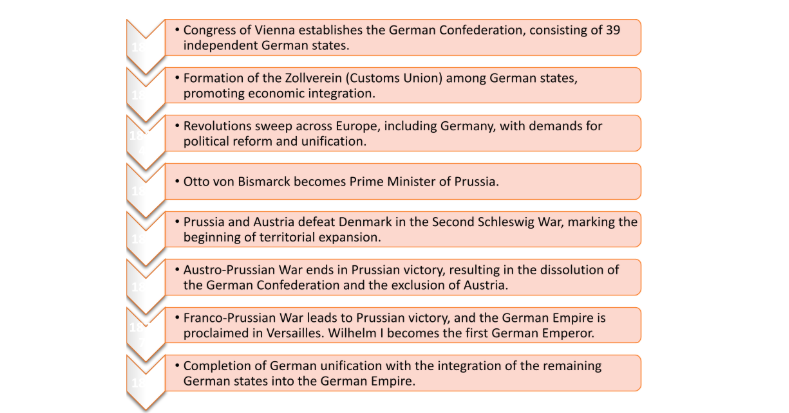Unification of Germany
Published on 05 Oct 2025
The unification of Germany refers to the process by which various German states and territories came together to form a single, unified nation-state. Led by Otto von Bismarck, the unification was driven by the rising tide of nationalism and accomplished through a series of wars, particularly against Austria and France.
Important Events that marked the German Unification

Factors leading to German Unification
Language: Before unification, there were over 300 distinct political entities in central Europe that spoke German. The shared language facilitated interaction and trade among these entities.
Example: German-speaking regions like Prussia, Bavaria, and Saxony.
Trade: The formation of the Zollverein, a customs union, abolished internal tariffs and promoted economic integration.
Industrial Revolution: It led to the rise of the capitalist class which favoured unification for better access to raw materials and capital.
Role of Vienna Congress: Divided Germany into 39 states and Austria was made the guardian which created resentment.
German Nationalism: During the Napoleonic Wars, the German settlements in central Europe shared a common experience of subjugation, fostering a sense of German nationalism.
Example: Intellectuals like Johann Gottlieb Fichte and Georg Wilhelm Friedrich Hegel contributed to the development of German nationalism.
Revolts and Failed Revolutions: 1848 saw widespread revolts across German states, leading to the imposition of democratic constitutions by rulers.
Blood and Iron Policy: Bismarck’s approach of using war and diplomacy to achieve the goals of German unification.
Example: The Franco-Prussian War in 1870 led to the final unification of Germany
Impact of German Unification
Political Transformation
Creation of the German Empire: German unification led to the establishment of the German Empire in 1871, with Wilhelm I as the first German Emperor.
Centralized Government: The unification brought about a centralized government under the leadership of Chancellor Otto von Bismarck.
Constitutional Reforms: Germany adopted a constitution that provided for a federal structure with the Bundesrat (Federal Council) and the Reichstag (Parliament).
Economic Advancement
Industrial Development: German unification spurred industrialization and economic growth, leading to the emergence of Germany as an industrial powerhouse.
National Markets: The removal of internal tariffs and the formation of a unified market through the Zollverein promoted economic integration and trade within Germany.
Infrastructure Development: The German government invested in infrastructure projects, such as railways and canals, to facilitate economic expansion and transportation.
Military Power
Strong Military Force: The unified German Empire became a formidable military power in Europe, with a well-equipped and disciplined army.
Modern Warfare Strategies: The Prussian military reforms and tactics implemented during unification, such as the concept of "blitzkrieg," revolutionized modern warfare.
Cultural and Intellectual Impact
German National Identity: The unification fostered a sense of German national identity and cultural unity, promoting a shared language, literature, and traditions.
Intellectual Contributions: Germany experienced a flourishing of intellectual and artistic achievements
Example: Goethe, Wagner, and Nietzsche made significant contributions to literature, music, and philosophy.
European Power Dynamics
Shift in Balance of Power: German unification altered the balance of power in Europe, challenging the dominance of traditional European powers like France and Austria.
Rising Tensions: The unified German Empire's growing strength and ambitions contributed to increased rivalries and tensions among European nations, leading to geopolitical shifts and conflicts.